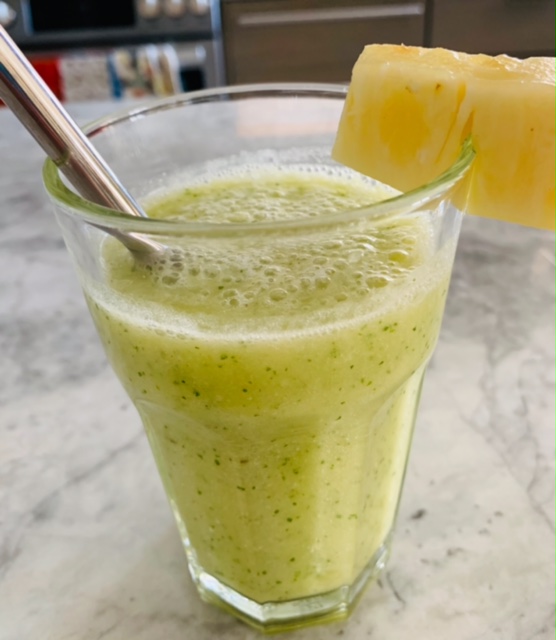Recipes for Managing Side Effects Series: Bloating
For many cancer patients, bloating is a common and uncomfortable complaint. Bloating is when the belly feels full and tight and it may look swollen [i]. There are several reasons why bloating may occur. These include:
- Swallowing air [i]
- Eating or drinking gas-producing foods or drinks [i]
- Delayed movement of food through the digestive tract resulting from treatment [ii, iii]
- Lactose intolerance from chemotherapy or radiation treatments that affect the production of the enzyme needed to digest dairy products [iii]
To avoid becoming bloated, individuals may consider limiting the following:
- Gas-producing vegetables such as broccoli, cabbage, cauliflower, legumes, onions, and cucumber
- Chewing gum as it may cause you to swallow air
- Carbonated beverages
- Dairy products if lactose intolerant
Ingredient Highlights
If you are feeling bloated, this healthy and delicious recipe for a Banana Pineapple Smoothie may help ease your discomfort.
Coconut water is a dairy-free option that provides valuable electrolytes such as potassium, which can assist with moving digestion along [iv]. Bananas are also a good source of potassium and have been found to ease bloating symptoms [v]. Pineapple contains a digestive enzyme called bromelain which has a number of beneficial health properties, including helping to regulate bacteria in the intestine [vi]. Lastly, mint has been found to be useful in aiding with many digestion issues [vii].
Recipe
Banana Pineapple Smoothie
Serves: 1
Serving Size: 1 cup

Ingredients
- 1/2 cup coconut water (unsweetened)
- 1 ripe banana
- 1/4 cup pineapple (fresh or frozen)
- Handful of mint leaves
- Ice
Instructions
- Combine all ingredients in a blender and mix until combined. Serve immediately and remember to sip slowly. Enjoy!
For more information on managing bloating, check out our interview with registered dietitian Tamara Duker Freuman, who specializes in the dietary management of digestive and metabolic diseases.
References:
[i] Abdominal Bloating. MedlinePlus.org. https://medlineplus.gov/ency/article/003123.htm. Updated September 1, 2021. Accessed September 8, 2021.
[ii] Gastrointestinal Complications (PDQ®) – Patient Version. Cancer.gov. https://www.cancer.gov/about-cancer/treatment/side-effects/constipation/gi-complications-pdq. Updated November 2020. Accessed September 8, 2021.
[iii] Andreyev J. Gastrointestinal symptoms after pelvic radiotherapy: a new understanding to improve management of symptomatic patients. Lancet Oncol. 2007;8(11):1007-1017. doi:10.1016/S1470-2045(07)70341-8
[iv] Chavalittamrong B, Pidatcha P, Thavisri U. Electrolytes, sugar, calories, osmolarity and pH of beverages and coconut water. Southeast Asian J Trop Med Public Health. 1982;13(3):427-431.
[v] Mitsou EK, Kougia E, Nomikos T, Yannakoulia M, Mountzouris KC, Kyriacou A. Effect of banana consumption on faecal microbiota: a randomised, controlled trial. Anaerobe. 2011;17(6):384-387. doi:10.1016/j.anaerobe.2011.03.018
[vi] Pavan R, Jain S, Shraddha, Kumar A. Properties and therapeutic application of bromelain: a review. Biotechnol Res Int. 2012;2012:976203. doi:10.1155/2012/976203
[vii] Alammar N, Wang L, Saberi B, et al. The impact of peppermint oil on the irritable bowel syndrome: a meta-analysis of the pooled clinical data. BMC Complement Altern Med. 2019;19(1):21. Published 2019 Jan 17. doi:10.1186/s12906-018-2409-0
